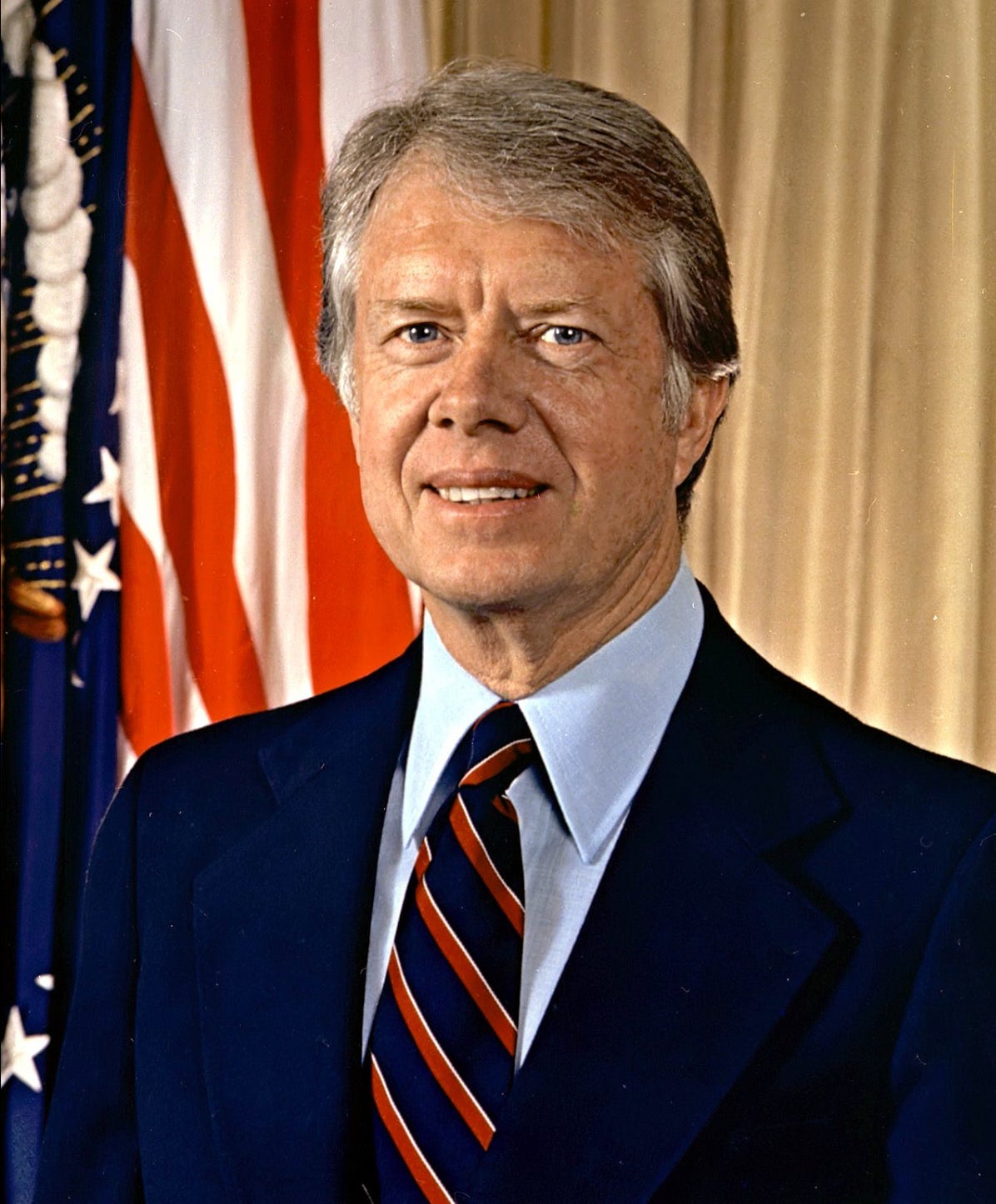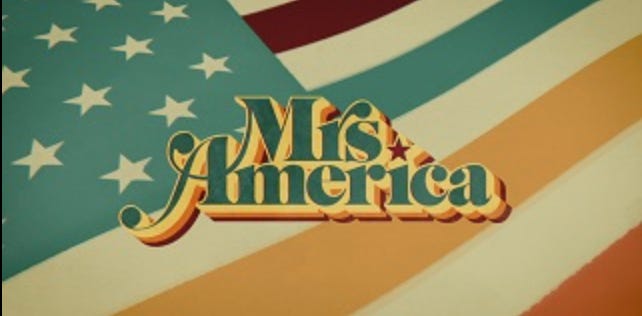Welcome aboard The Bus!
The Stop
Jimmy Carter (1924 - ) was the 39th President of the United States, serving from 1977 - 1981. At the time of his presidency, the country was experiencing a number of serious domestic and international problems, and a ‘perceived inability’ to successfully address these issues led to an ‘overwhelming defeat in his bid for reelection.’ Nevertheless, his work in both diplomacy and advocacy during and after his time in office, saw him awarded the Nobel Prize for Peace in 2002.1
Carter was born in Plains, Georgia to Earl - a peanut warehouser and sometime state politician - and Lillian - a registered nurse who at 68 travelled to India as a volunteer with the Peace Corps. The young Carter attended Georgia Southwestern College and the Georgia Institute of Technology, graduating from the US Naval Academy in 1946. That same year Carter married his childhood sweetheart - Rosalynn - and began a seven-year career in the navy as a submariner. His naval career was cut short in 1953 when the death of his father led to his decision to return to Georgia to manage the family peanut business.
Following his initial foray into politics through serving on the local board of education, the Democrat Carter was elected to the Georgia state senate in 1962 and 1964. A failed bid for the governorship in 1966 led to a depression which he addressed by becoming a born-again Baptist. A second attempt at the governorship in 1970 was successful, and his time in office saw major changes. Declaring in his inaugural address that ‘the time for racial discrimination is over,’ Carter opened Georgia’s government by appointing both African Americans and women, and he reorganised the state’s outdated, byzantine administration and tightened budgets. Popular in Georgia, he soon began receiving national attention, eventually making the cover of Time magazine, heralded as a ‘symbol of both good government and the ‘New South.’’
Winning the Democratic nomination in July 1976, Carter chose the liberal Senator Walter F. Mondale of Minnesota as his Vice Presidential running mate against the unelected incumbent Republican president, Gerald R. Ford. Throughout his campaign, Carter styled himself as an outsider against corrupt Washington, a man of ‘strong principles who could restore the faith of the American people in their leaders.’ Almost immediately upon taking office, Carter introduced an ambitious and ‘dizzying array’ of programmes designed for governmental, social, economic reform. However, most of these programmes came up against severe Congressional opposition which served to undermine any of his administration’s successes,2 and by 1978 his ‘initial popularity had dissipated in the face of his inability to convert his ideas into legislative realities.’ Additionally, a series of scandals, an energy crisis that had been growing since the early 1970s,3 rising inflation, a stagnating economy, the capture of the American embassy in Teheran, and the subsequent Iran Hostage Crisis4 meant that circumstances were ripe for Ronald Reagan’s landslide victory over Carter in the next election.
After leaving the White House, Carter returned to Georgia and devoted himself to working on alleviating a number of international crises and humanitarian causes, efforts which have created a more favourable image of him than during his time in office. Perhaps his best known project is his ‘highly visible participation in building homes for the poor through Habitat for Humanity.’ He also became a prolific author of many books on various topics including the Middle East, a novel and a poetry collection. His later books have seen him reflecting on the ‘lessons of aging and his long life,’ and he is currently living in Plains with Rossalyn, though he has been in hospice care since February. At 98, he is the oldest living former President, and one who understood the true purpose of that office.
The Detour
Today’s Detour is to Ladies Room (5:08), a comedic exploration of the Bechdel Test - a way of assessing the ‘depth of female characters in a film by checking if at any point at least two women speak to each other about something other than a man.’ The result is rather amazing - and, while serious, intentionally funny. At one point, I laughed out loud. Enjoy.
The Recommendation
Today’s Recommendation is the nine episode miniseries Mrs. America. First broadcast in April 2020 and starring Cate Blanchett, the series tracks the unsuccessful attempt to pass the Equal Rights Amendment in the late 1970s - unsuccessful largely because of an unexpected backlash led by the conservative activist Phyllis Schlafly. Told through the perspectives of various participants in the endeavour, including Schlafly, Gloria Steinem, Betty Friedan, Shirley Chisholm and Bella Azbug, the series examines how a seemingly obvious feminist victory resulted in the emergence of the powerful Moral Majority, changing the face of American politics.
The Sounds
Today’s playlist is a selection of five tracks from the ‘heyday’ of Carter’s Presidency - 1979: ‘Let’s Go’ (The Cars, Candy-O), ‘Rock ‘n’ Roll Fantasy’ (Bad Company, Desolation Angels), ‘Tusk’ (Fleetwood Mac, Tusk), ‘Don’t Bring Me Down’ (Electric Light Orchestra, Discovery) and ‘Since You Been Gone’ (Rainbow, Down to Earth).5 Enjoy!
The Thought
Today’s Thought is from Jimmy Carter’s inaugural speech as Governor of Georgia. A needed message then, it’s unfortunately a reminder that needs repeating today:
‘I say to you frankly, the time for racial discrimination is over.’
If you have a thought on this Thought - or any part of today’s issue - please leave a comment below:
And that’s the end of this Stop - I hope you enjoyed the diversion!
Thanks to everyone who subscribes - your interest and support is truly appreciated. If you like The Bus, please SHARE it with a friend or two.
If you haven’t climbed aboard The Bus, please do!
If you like The Bus, why not check out other newsletters?
The Sample sends out articles from blogs and newsletters across the web that match your interests. If you like one, you can subscribe with one click.
Refind picks five links from around the web that make you smarter, tailored to your interests. Refind is a must-read newsletter loved by over 200,000 curious minds. There’s also a very cool app. Sign up for free!
Until the next Stop …
A few days ago I read a reference about Carter having been in hospice care since February - and was amazed that he was still living. My wife mentioned I ought to do a Stop about him while he was still alive and I immediately slotted him into the plan. I’ve always liked Carter because he seemed to be a decent guy who had some great ideas that circumstances conspired to hamper. In fact, around 2010 a history colleague who enjoyed positing ‘Top Five’ lists - your ‘Top Five Conspiracy Theories,’ your ‘Top Five Most Important WWI Battles’ - asked me to list my ‘Top Five Presidents,’ which got me thinking. And, in the end, it was: John Adams, Thomas Jefferson, Teddy Roosevelt, Jimmy Carter and Bill Clinton. And that list hasn’t changed (though number one on my ‘Top Five Worst Presidents’ has certainly changed since that date). More on that list later. Sources for today’s Stop include Jimmy Carter (Britannica), Carter/Speech (Archives), Jimmy Carter (Hospice) (Town and Country).
In foreign affairs, Carter - his ‘idealism notwithstanding’ - was recognised for ‘championing international human rights’ and having two major political successes: (1) in 1977, two treaties between the US and Panama were signed, giving Panama control over the Panama Canal at the end of 1999 while guaranteeing the canal’s neutrality, and (2) in 1978, Carter brokered the Camp David Accords between Anwar Sadat and Menachem Begin, ending the state of war which had existed between Egypt and Israel since Israel’s founding in 1948.
Carter’s desire to move from oil dependency towards alternative fuels including nuclear was a difficult ask to begin with - and became even more so after the Three Mile Island nuclear meltdown in March, 1979.
On 4 November 1979, a mob of Iranian students invaded the embassy and took the staff hostage, an action sanctioned by Iran’s revolutionary government. Carter’s inability to obtain the hostages’ release became a ‘major political liability,’ a problem compounded by the failure of a secret U.S. military rescue mission which ‘ended almost before it began with a crash in the desert of a plane and helicopter.’ To the general public, this typified the ‘inefficacy and misfortune of the Carter administration.’
I was very young during Carter’s Presidency (I turned 11 in 1980, so Reagan was ‘my’ President) and have few memories of him. However, I was an avid radio listener at this time and these five tracks remain essential. Seriously, these are all great songs - just try not to play air guitar while singing along and throwing a few hand-shapes to Rainbow.








Being from Atlanta in the 70s, Carter was always one of my heroes. I love that while his post-presidency work is widely considered the most influenced of anyone elected to that office, even his presidency is being reconsidered as more successful than seen at the time. Kai Bird--of recent American Prometheus/Oppenheimer fame--wrote a fantastic analysis of Carter focused on his presidency that made this point. I appreciated your reflection (and didn’t the 70s have some fantastic music?).
"Jimmy Carter (1924- )": Are you getting your obituary in first?